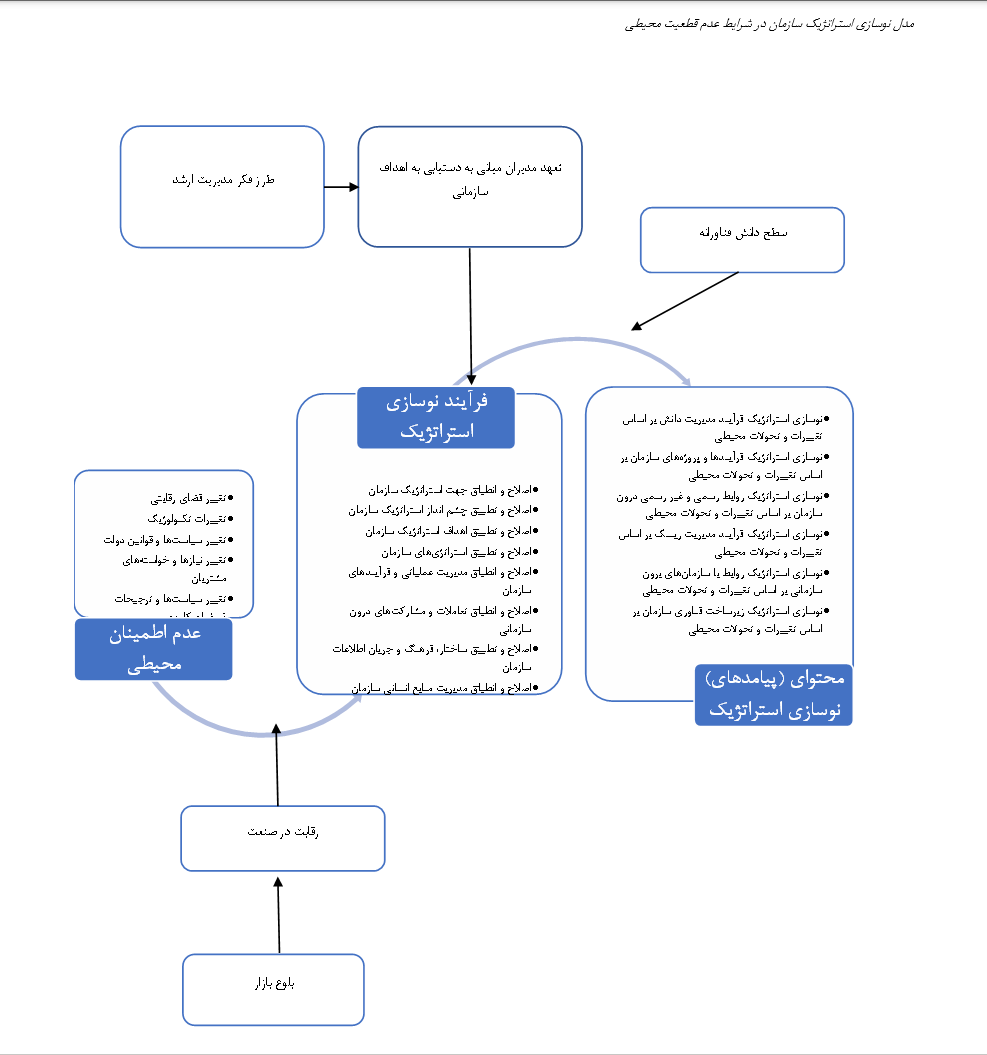The Strategic Renewal Model of Organizations Under Environmental Uncertainty (Case Study: Startup Organizations in the Payment Industry)
Keywords:
Uncertainty, Strategic Renewal, Startup Organizations, Payment Industry, FinTech SectorAbstract
The concept of strategy is intertwined with environmental uncertainty. In fact, strategic management can be seen as a systematic approach to dealing with environmental turbulence and changes, ultimately ensuring business success and preventing the negative consequences of environmental changes in business. Therefore, many researchers and managers seek solutions to reduce the impact of uncertainty in order to make effective strategic decisions. Among the various methods that managers choose to manage environmental uncertainty, strategic renewal is considered one of the most effective approaches. Some businesses, such as payment startups, face greater environmental uncertainties due to the nascent nature of the industry on one hand and the nascent state of the organization on the other. The strategic management literature does not provide a comprehensive solution for the strategic renewal of nascent businesses. Hence, this study, using the case study research method and focusing on an active startup in the payment industry, aims to propose a model for the strategic renewal of payment startups operating in environments with high uncertainty. This research revealed that among environmental factors, certain factors lead to increased environmental uncertainty for startup businesses. Additionally, in this model, the components of the strategic renewal process, as well as the outcomes and consequences of implementing strategic renewal in these businesses, have been identified.
Downloads
References
Anshari, M., Almunawar, M. N., & Masri, M. (2019). An Overview of Financial Technology in Indonesia. In Financial
Technology and Disruptive Innovation in ASEAN (pp. 216-224). IGI Global. https://doi.org/10.4018/978-1-5225-
-2.ch012
Arner, D. W., Barberis, J., & Buckey, R. P. (2016). FinTech, RegTech, and the reconceptualization of financial
regulation. Northwestern Journal of International Law & Business, 37(3), 371-394. https://www.mdpi.com/2071-
/12/19/8035
Asadi Ghanbari, A., Salamati Taba, S. S., Daneshgar, S. A., & Heydari, F. (2016). Fintechs or Opportunities and Their
Role in the Future of Banking Proceedings of the 6th National Conference on Electronic Banking and Payment
Systems, Tehran. https://civilica.com/doc/785642/
Asadollah, M., Sanavi Fard, R., & Hamidi Zadeh, A. (2019). Business Model of Electronic Banking Based on the
Emergence of Fintechs and Financial Startups. Technology Development Management, 7(2), 248-195.
https://jtdm.irost.ir/article_854.html
Chen, X., Yu, X., & Chang, V. (2021). FinTech and commercial banks' performance in China: A leap forward or survival
of the fittest? Technological Forecasting & Social Change. https://doi.org/10.1016/j.techfore.2021.120645
Cheng, M., & Qu, Y. (2020). Does bank FinTech reduce credit risk? Evidence from China. Pacific-Basin Finance
Journal. https://doi.org/10.1016/j.pacfin.2020.101398
Chuen, K., & Lee, D. (2017). Fintech tsunami: Blockchain as the driver of the Fourth Industrial Revolution.
Lyons, A. C., Kass-Hanna, J., & Fava, A. (2020). Fintech development and savings, borrowing, and remittances: A
comparative study of emerging economies. Emerging Markets Review. https://doi.org/10.2139/ssrn.3689142
Moretti, D. M., Alves, F. C., & Bomtempo, J. V. (2020). Entrepreneurial-oriented strategic renewal in a Brazilian SME:
A case study. Journal of Small Business and Enterprise Development, 27(2), 219-236.
https://doi.org/10.1108/JSBED-07-2019-0254
Najafi, F., Irandoost, M., Soltan Panah, H., & Sheikh Ahmadi, A. (2019). Designing a Model for Managing the
Relationship between the Banking Industry of Iran and Fintechs and Fintech Startups with a Grounded Theory
Approach. Business Strategies Journal, 12(19), 12-11. https://cs.shahed.ac.ir/article_2418.html
Pettit, K. L., & Crossan, M. M. (2019). Strategic renewal: Beyond the functional resource role of occupational members.
Strategic management journal, 41(6), 1112-1138. https://doi.org/10.1002/smj.3115
Rohani Rad, S. (2015). Fintech; An Exploration of the World and Iran. Journal of Science and Technology, 11(1), 27-
https://www.sid.ir/paper/361610/fa
Shu, C., De Clercq, D., Zhou, Y., & Liu, C. (2019). Government institutional support, entrepreneurial orientation,
strategic renewal, and firm performance in transitional China. International Journal of Entrepreneurial Behavior &
Research, 25(3), 433-456. https://doi.org/10.1108/IJEBR-07-2018-0465
Wiegner, B. (2016). Financial management for innovation fintech-start-ups vs. usual companies.
https://doi.org/10.2139/ssrn.2883994
Wijaya Kusuma, G., & Sudhartio, L. (2020). The impact of strategic renewal in banking industry performance.

Downloads
Published
Submitted
Revised
Accepted
Issue
Section
License
Copyright (c) 1403 Journal of Technology in Entrepreneurship and Strategic Management (JTESM)

This work is licensed under a Creative Commons Attribution-NonCommercial 4.0 International License.










